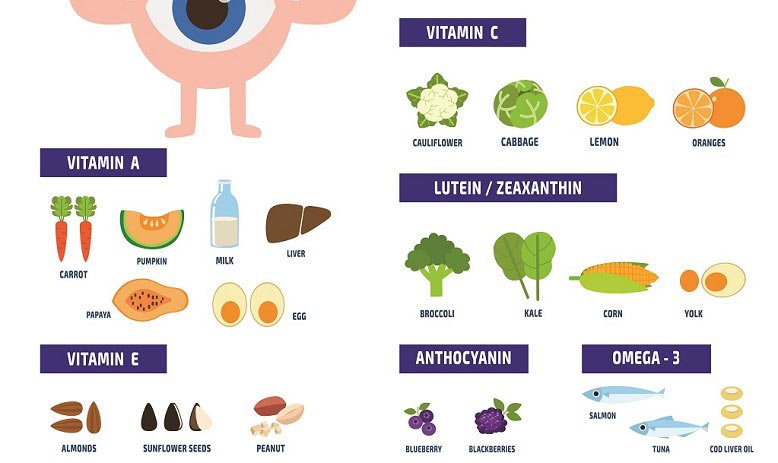It is alarming to know that an estimated 253 million people live with vision impairment worldwide, including 36 million who are blind and 217 million who have moderate to severe vision impairment, according to the World Health Organization (WHO). Poor nutrition is a significant factor contributing to vision problems, especially as people age. Both children and older adults can experience eyesight issues due to inadequate nutrition. Ensuring a diet rich in essential vitamins and nutrients can help maintain eye health and reduce the risk of vision impairment. This article explores the best foods and vitamins for eye health.
The Importance of Nutrition for Eye Health
Proper nutrition is crucial for maintaining good vision and eye health. Vitamins and minerals found in various foods play essential roles in protecting the eyes from damage, reducing inflammation, and preventing age-related eye diseases.

Best Vitamins for Eye Health
Beta-Carotene
Beta-carotene is a powerful antioxidant that helps protect the eyes from free radical damage. It is converted into vitamin A in the body, which is vital for maintaining good vision and preventing age-related macular degeneration (AMD).
Sources of Beta-Carotene:
- Carrots
- Sweet potatoes
- Kale
- Winter squash
- Cantaloupe
- Apricots
Vitamin A
Vitamin A is essential for maintaining healthy vision, particularly for preventing childhood blindness and maintaining the health of the retina. Deficiencies in vitamin A can cause xerophthalmia, a condition that leads to severe dryness of the eyes and can result in blindness.
Sources of Vitamin A:
- Beef liver
- Eggs
- Milk
- Butter
- Spinach
- Sweet potatoes
- Broccoli
Vitamin E
Vitamin E is crucial for maintaining healthy cells and tissues in the eyes. It helps reduce the risk of age-related macular degeneration (AMD) and cataracts.
Sources of Vitamin E:
- Almonds
- Avocados
- Sunflower seeds
- Butternut squash
- Spinach
Zinc
Zinc is vital for eye health as it helps slow down the progression of cataracts and reduces the risk of blindness. It supports the growth and maintenance of eye tissues and helps prevent inflammation and autoimmune reactions.
Sources of Zinc:
- Fish
- Organ meats
- Grass-fed meat
- Pork
- Chicken
- Dark chocolate
- Beans
Omega-3 Fatty Acids
Omega-3 fatty acids are essential for maintaining eye health, reducing inflammation, and preventing age-related eye conditions. They help protect against dry eyes and AMD.
Sources of Omega-3 Fatty Acids:
- Salmon
- Cod liver oil
- Walnuts
- Flaxseeds
- Chia seeds
Lutein
Lutein is a vital nutrient for eye health, known for protecting against macular degeneration and inflammation. It acts as a natural antioxidant, filtering harmful blue light and protecting the retina.
Sources of Lutein:
- Leafy green vegetables (e.g., spinach, kale)
- Egg yolks
- Citrus fruits
- Orange and colorful fruits and vegetables
Zeaxanthin
Zeaxanthin is another powerful antioxidant that helps prevent cataracts and macular degeneration. It protects the retina from damage and supports overall eye health.
Sources of Zeaxanthin:
- Yellow peppers
- Broccoli
- Mangoes
- Corn
Best Foods for Eye Health
Including a variety of nutrient-rich foods in your diet can significantly improve eye health and reduce the risk of vision problems. Here are some of the best foods to include in your diet for optimal eye health:
Colorful Fruits and Vegetables
Fruits and vegetables are packed with essential vitamins, antioxidants, and minerals that support eye health. Eating a variety of colorful fruits and vegetables ensures you get a wide range of nutrients.
Key Foods:
- Apples
- Oranges
- Blackberries
- Blueberries
- Pomegranate
- Tomatoes
- Winter squash
- Green leafy vegetables (e.g., spinach, kale)
Whole Grains
Whole grains provide essential nutrients and fiber, supporting overall health and reducing the risk of eye conditions.
Key Foods:
- Brown rice
- Oats
- Quinoa
Healthy Fats
Healthy fats from plant sources can help reduce inflammation and support eye health.
Key Foods:
- Avocados
- Nuts (e.g., almonds, walnuts)
- Seeds (e.g., flaxseeds, chia seeds)
- Olive oil
Protein-Rich Foods
Protein is essential for maintaining muscle mass and supporting the immune system, which is crucial for eye health.
Key Foods:
- Lean meats (e.g., skinless poultry, lean cuts of red meat)
- Fish (e.g., salmon, mackerel)
- Plant-based proteins (e.g., beans, lentils, tofu)
Lifestyle Tips for Eye Health
In addition to a nutritious diet, other lifestyle modifications can significantly reduce the risk of vision impairment and support overall eye health. According to WHO, between 30% and 50% of cancer deaths could be prevented by modifying or avoiding key risk factors, which also apply to eye health. These include:
- Avoiding Tobacco Products: Smoking is a leading cause of various eye diseases, including AMD and cataracts.
- Reducing Alcohol Consumption: Excessive alcohol intake can increase the risk of eye conditions.
- Maintaining a Healthy Body Weight: Obesity is a risk factor for diabetes, which can lead to diabetic retinopathy and other vision problems.
- Exercising Regularly: Physical activity helps maintain overall health and can reduce the risk of eye diseases.
- Protecting Your Eyes from UV Light: Wear sunglasses that block UV rays to protect your eyes from sun damage.
Finishing Touch
A diet rich in vitamins and nutrients is crucial for maintaining eye health and reducing the risk of vision impairment. By incorporating these eye-healthy foods into your daily diet and making positive lifestyle changes, you can protect your eyes and ensure long-term vision health. Always consult with a healthcare professional or nutritionist to tailor dietary choices to your specific health needs and conditions. By making informed dietary choices and adopting healthy habits, you can significantly impact your eye health and overall well-being. Embrace these changes and take control of your vision health today.
